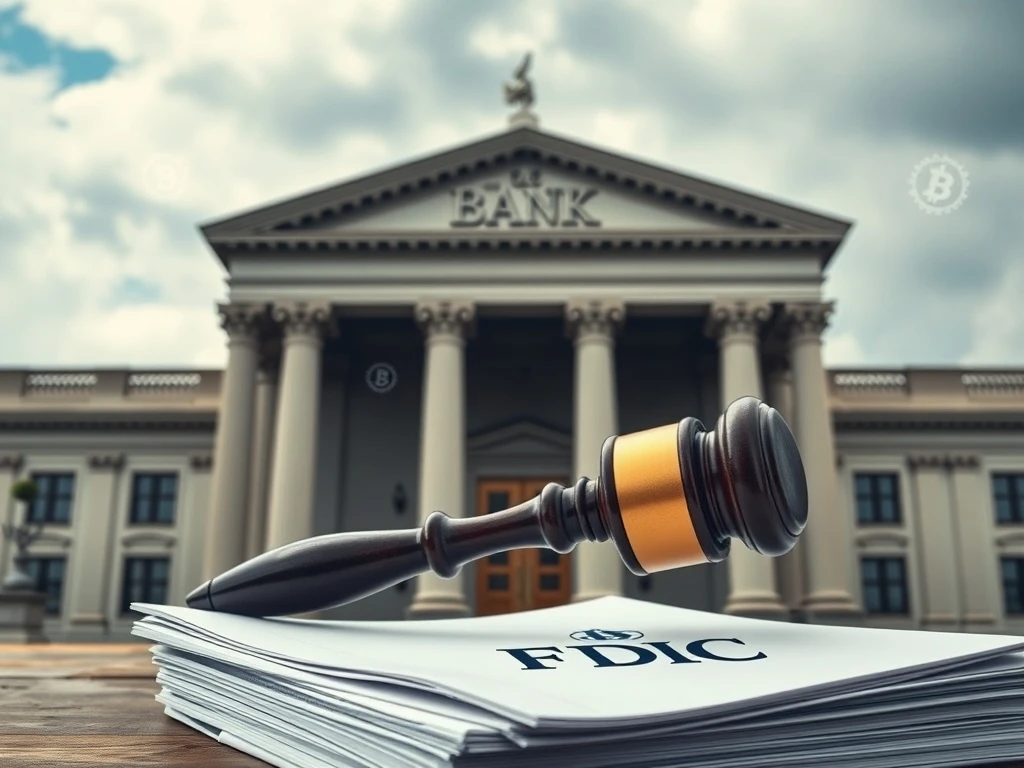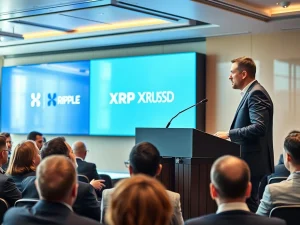FDIC Crypto Review: Unveiling Crucial Changes for Banking Relationships

The landscape of digital assets constantly evolves. Recently, a pivotal development emerged concerning the relationship between traditional banks and the burgeoning cryptocurrency sector. The Federal Deposit Insurance Corporation (FDIC) is poised to review a significant rule. This review could fundamentally reshape how banks engage with crypto firms. For many in the crypto community, this decision carries immense weight, especially given past allegations of crypto debanking. Understanding these potential changes is crucial for anyone involved in digital assets.
FDIC Crypto Rule Review: A Critical Juncture
The Federal Deposit Insurance Corporation’s board of directors will soon discuss proposed rules. These rules directly impact cryptocurrency firms amid ongoing allegations of ‘debanking.’ On Thursday, the FDIC issued a notice. This notice stated its board would consider a proposed rulemaking. The rule focuses on ‘prohibition on use of reputation risk by regulators.’ While the agenda did not explicitly mention debanking concerns tied to digital assets, the acting FDIC chair, Travis Hill, has previously voiced criticism. Hill believes regulators used ‘reputation risk’ unfairly. This justification often prevented banks from engaging in various banking crypto activities, such as allowing clients to send funds to exchanges.
Former US President Donald Trump highlighted this issue. He used the term in an August executive order. This order aimed at ‘guaranteeing free banking.’ Trump claimed that regulators accessing ‘reputation risk’ could lead to ‘politicized or unlawful debanking.’ The executive order did not specifically mention digital assets. Nevertheless, its implications for the crypto industry are clear. Before Trump’s order, many crypto firms reported being denied access to essential US banking services. They alleged this was part of an orchestrated push by authorities. Their ties to digital assets were the primary reason for these denials.
The Shadow of Operation Chokepoint 2.0
Allegations of systemic denial of banking services have long plagued the crypto industry. Many refer to these alleged actions as ‘Operation Chokepoint 2.0.’ This term evokes memories of a similar initiative in the 2010s. During that period, authorities pressured banks to cut ties with certain industries deemed ‘high risk.’ Court documents, made public in December through a Freedom of Information Act request with the FDIC, revealed significant details. These documents showed the regulator asked some institutions to ‘pause all crypto asset-related activity’ in 2022. Such directives certainly fueled concerns within the digital asset community. They suggested a coordinated effort to limit crypto’s access to traditional finance.
This issue became a prominent campaign topic for Donald Trump and many Republicans during the 2024 election. After Trump’s victory and Hill’s appointment as acting FDIC chair, Hill promised a reevaluation. He stated the regulator would be ‘reevaluating [its] supervisory approach to crypto-related activities.’ This pledge offers a glimmer of hope for crypto businesses seeking fair access to banking services. However, the exact scope and timeline of these reevaluations remain to be seen. The crypto industry eagerly awaits concrete actions from the FDIC. They hope for policies that foster innovation rather than hinder it.
Navigating the Evolving Crypto Regulation Landscape
The current discussions at the FDIC are part of a broader trend. Governments worldwide are grappling with how to effectively regulate digital assets. In the United States, various agencies hold sway over different aspects of the crypto market. These include the Securities and Exchange Commission (SEC) and the Commodity Futures Trading Commission (CFTC). Each agency contributes to the complex web of crypto regulation. The FDIC’s focus on ‘reputation risk’ highlights a particular challenge. Regulators often use subjective criteria to assess the risks associated with crypto firms. This approach can create uncertainty and inconsistency for banks. It also makes it difficult for crypto businesses to secure stable banking relationships.
The upcoming FDIC review could set new precedents. It might establish clearer guidelines for banks interacting with crypto companies. This clarity is desperately needed. It could help mitigate the ‘debanking’ phenomenon. Furthermore, it could encourage more traditional financial institutions to explore partnerships with legitimate crypto businesses. A transparent regulatory framework benefits everyone. It protects consumers, fosters innovation, and ensures financial stability. The crypto industry, therefore, watches these developments with keen interest. They understand the profound impact these decisions will have on their future operations.
Impact of Government Shutdown and Future Outlook
Adding another layer of complexity, a US government shutdown occurred recently. On Tuesday at midnight, the government shut down. Lawmakers failed to pass a bill extending funding beyond October 1. This shutdown significantly reduced operations at many US financial regulators. Agencies like the SEC and CFTC experienced disruptions. However, the FDIC declared it would remain ‘open and operational.’ This commitment ensures the crucial review of the ‘reputation risk’ rule can proceed. The FDIC’s continued operation is a positive sign. It indicates a dedication to addressing these pressing issues, regardless of broader political stalemates.
The outcome of the FDIC’s review holds significant implications. It could either ease or further complicate the relationship between banks and crypto firms. If the FDIC adopts a more accommodating stance, it could unlock new opportunities for growth and integration. Conversely, if ‘reputation risk’ remains a dominant factor, crypto debanking could persist. This would continue to challenge the digital asset industry. Ultimately, the goal should be to create a balanced regulatory environment. Such an environment protects consumers while allowing innovation to flourish. The upcoming FDIC meeting marks a pivotal moment in this ongoing dialogue.
Ensuring Fair Access: The Path Forward for FDIC Crypto Policies
The ongoing discussion around FDIC crypto policies underscores a fundamental need. The crypto industry requires fair and equitable access to banking services. Without it, legitimate businesses struggle to operate. They face hurdles in managing payroll, paying suppliers, and serving customers. The current review by the FDIC provides an opportunity. It can address these systemic issues head-on. By reevaluating the use of ‘reputation risk,’ the FDIC can promote a more objective approach to assessing risk. This shift would benefit both banks and crypto firms.
Key considerations for the FDIC include:
- Clarity in Guidelines: Developing explicit rules for banks engaging with crypto assets.
- Objective Risk Assessment: Moving beyond subjective ‘reputation risk’ to concrete, measurable criteria.
- Promoting Dialogue: Encouraging open communication between regulators, banks, and crypto businesses.
- Preventing Discrimination: Ensuring that legitimate crypto firms are not unfairly denied banking services.
Such measures would help dismantle the lingering effects of Operation Chokepoint 2.0. They would also foster a healthier financial ecosystem for digital assets. The future of banking crypto relationships depends heavily on these upcoming decisions. The industry remains hopeful for a resolution that supports innovation and fair competition. As the FDIC moves forward, its choices will undoubtedly shape the trajectory of crypto in the traditional financial system.









